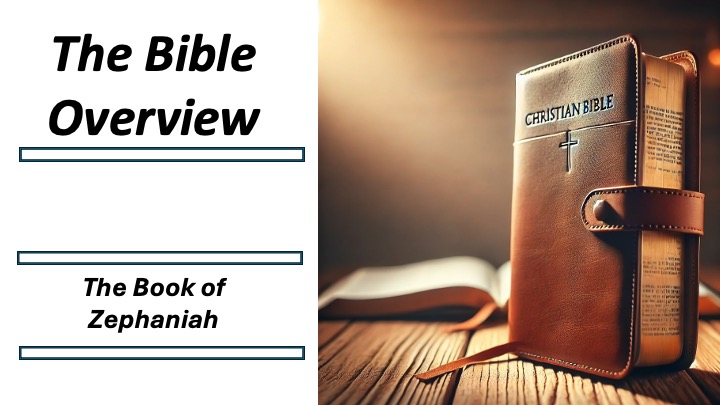Bible Overview Zephaniah
Mike Ervin

A comprehensive overview of the Book of Zephaniah, covering its authorship, date, main themes, chapter summaries, and its significance.
1. Authorship of Zephaniah
Traditional View
• The book opens by attributing its content to “Zephaniah son of Cushi son of Gedaliah son of Amariah son of Hezekiah,” suggesting a lineage that may trace back to King Hezekiah of Judah.
Modern Scholarly View
• Scholars acknowledge the superscription but debate its historical accuracy, noting that such genealogies might have been added to lend authority to the text.
2. Date of Authorship
Traditional View
• The superscription places Zephaniah’s prophetic activity during the reign of King Josiah (640–609 BCE), suggesting a 7th-century BCE context.
Modern Scholarly View
• While some scholars accept a 7th-century BCE date, others propose that certain sections, especially those with themes of restoration, may have been added during or after the Babylonian exile (6th century BCE).
3. Main Themes
• The Day of the Lord: A central theme, depicting a time of divine judgment against sin, not only for Judah but for surrounding nations.
• Judgment and Restoration: The book balances warnings of impending judgment with promises of future restoration for a faithful remnant.
• Universal Sovereignty of God: Emphasizes that God’s authority extends beyond Judah to all nations.
4. Chapter Summaries
Chapter 1: Pronouncement of Judgment
• Verses 1-3: Introduction and declaration of a universal judgment.
• Verses 4-13: Specific indictments against Judah and Jerusalem for idolatry and complacency.
• Verses 14-18: Description of the “great day of the Lord” as a time of wrath and distress.
Chapter 2: Call to Repentance and Judgment on Nations
• Verses 1-3: A call for humility and seeking righteousness to perhaps be spared.
• Verses 4-15: Oracles against surrounding nations (Philistia, Moab, Ammon, Cush, and Assyria) highlighting their impending doom.
Chapter 3: Judgment on Jerusalem and Promise of Restoration
• Verses 1-7: Denunciation of Jerusalem’s rebelliousness and corruption.
• Verses 8-13: Promise that nations will be purified, and a humble remnant will seek refuge in the Lord.
• Verses 14-20: A concluding hymn of joy celebrating God’s presence and the future restoration of Israel.
5. Conclusion: Importance of the Book
• Theological Significance: Zephaniah underscores the seriousness of sin and the certainty of divine judgment, while also highlighting God’s mercy and the hope of restoration.
• Literary Contribution: The vivid imagery of the “day of the Lord” has influenced subsequent prophetic and apocalyptic literature.
• Contemporary Relevance: The themes of justice, humility, and reliance on divine grace continue to resonate in discussions about moral and spiritual integrity.
The Book of Zephaniah serves as a profound reminder of the balance between divine justice and mercy, calling readers to self-examination and renewed commitment to righteousness.